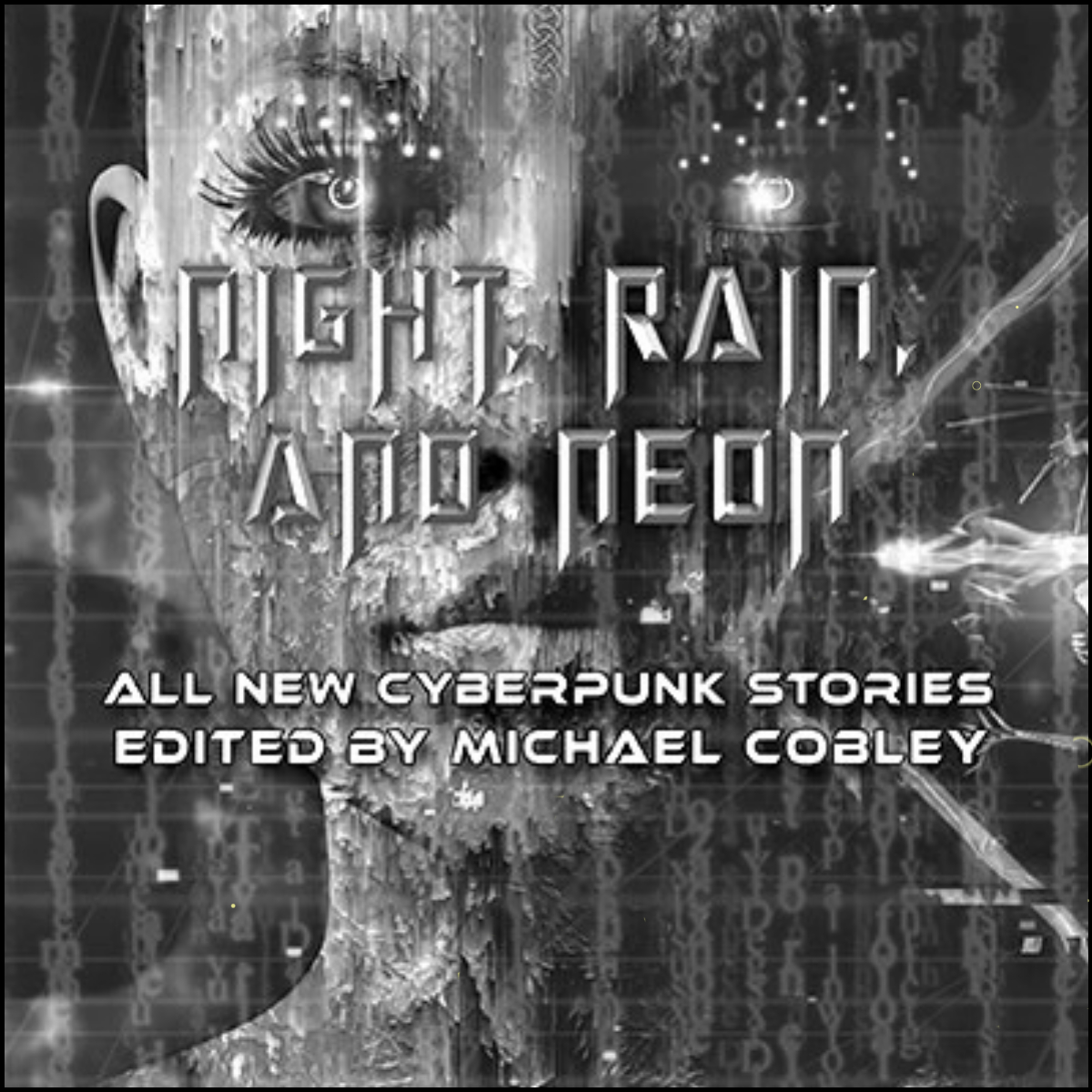
I received an electronic copy of this book through LibraryThing's Early Reviewers program in exchange for an honest review.Curating an anthology is an exhilarating and demanding task for a new editor. To start, you are expected to be widely read in both the form and the genre you are curating. From this experience comes an idea that you must turn into submissions and selected stories. Then, you must cultivate a relationship with each author that allows you to probe deeply into their work so you can represent each of their unique voices. Then comes the revision of grammar and the like. In addition to these many hats, you must also work within the constraints of your editing experience and your publisher’s time and budget. And finally, if you’ve done your job well, all of this labour will be nearly invisible behind the stories it is meant to highlight.
Night, Rain, and Neon: All New Cyberpunk Stories is Michael Cobley’s first work as an editor. He is most well known as a science fiction and fantasy novelist, though his collection Mosaic Iron contains all but two of his own dark-fantasy and cyberpunk short stories. He is clearly well established and connected in the genre; Night, Rain, and Neon offers eighteen unpublished stories from as many seasoned and award-winning authors. It pays homage to cyberpunk legend, William Gibson on the 40th anniversary of the release of his novel Neuromancer.
I will start with what Cobley did well.
The good
The first decision you must make as an editor assembling an anthology is whether you would like to unify the stories with a theme or let them stand on their own. While cyberpunk is a fairly small genre and could serve effectively as a theme, I think Cobley’s choice to honour Neuromancer must have been exactly what the authors needed to hear. The cohesiveness of the big question themes classic to cyberpunk supported by the gritty tone across the stories made transitioning between them easy and reading multiple pieces in a sitting, possible.
The not so good
Despite Cobley’s ability to attract experienced writers, I think his own lack of experience as an editor was the downfall of this book.
The writing ranges from very weak to nearly flawless, which left unedited, undermines his successful execution of theme. Of course, the nature of selecting a large number of stories is that some will be weaker than others. Typically, you want to start with a story that masterfully draws the reader into the book and provides a thematic foundation for the remaining stories to build upon. Cobley started with a middle-of-the-road story and followed with two that got progressively worse. If I wasn’t reviewing this book, I would have closed it a couple of pages into the third story. I am glad I didn’t, because Night, Rain, and Neon did end up offering some powerful pieces, but a boring beginning doesn’t bode well for the average reader.
The reason for this range in writing quality is twofold. First, the strongest stories were written by Callum McSorely, Tim Maughan, Louise Carey, and TR Napper, authors who have numerous short story credits and/or spend a lot of time story writing for D&D. Almost all of the other authors are primarily novelists, and while their world-building might be strong, they are lacking not only the brevity and articulation required of a short story, but in many cases, a story with a strong beginning, middle and end.
This leads to my second point: there are multiple phases in editing—developmental, structural, stylistic, and copyedit—and just as in an excellent novel, a well-edited anthology will go through the rigours of each. There are times when budget or time constraints only allow for a light style edit for cohesiveness, then the copyedit, and a final proofread. The result is less consistency of short story mastery across the book, but if the writers are experienced short storyists, it can work. In the case of Night, Rain, and Neon, an editor with a strong handle on the short story development and structure is fundamental in closing the gap between the writers’ skill sets and creating a cohesive final copy. The fact that the stories by experienced short story writers are so much stronger than those that aren’t, leads me to believe that Cobley is not familiar enough with the form to see what is missing.
Setting aside the challenges of wide-ranging writing quality, budget and time constraints, an editor’s final job is to make sure what is written doesn’t distract the reader any further. Frankly, the sentence mechanics errors, grammar faults, and typos in this text could have been cleaned up by the free version of Grammarly—there are far too many to be blamed on a botched proofread. The final editing of this book wasn’t a series of inexperienced choices, it simply wasn’t done.
TL; DR
There could be many reasons why this book was published in such a raw state: inexperience, time constraints, or lack of funding. But it’s unfortunate to see a project with so much potential not get the reviews it could have. The ideas are strong, the images are vivid, and there is an interesting variety of characters and plot lines. If you can hold on through the weaker storylines, longer exposition, and the missing edit, there are some gems to be found. I give this book 2.5 out of 5 stars. (Here are my review criteria.)
Here are my story-by-story synopses, reviews, and ratings:
“Hello, Goodbye” Steward Hotston
Itsay is satisfied that he has worked hard enough to be digitally transferred to another body when the virus finally takes him, but unfortunately, success isn’t as simple as that. Without an adequate buildup of tension at the beginning of the story, the following action feels somewhat directionless. I didn’t mind the ending though. (2.5/5 stars)
“Four Green Fields, and Fair” by Ian McDonald
Corporate sponsorship, rebranding, and agents are just a part of Ciara’s superhero life—strut, battle, pose, repeat. I like stories with a realistic take on something we romanticize. The fast pace keeps it immersive but there isn’t a lot to invest in. (3/5 stars)
“All the Precious Years” by Al Robertson
Laurent battles multinational hackers as a contract neurotech operative, but he can’t save his mother from dementia. Robertson’s imagery and worldbuilding are compelling but depend too heavily on coincidence. Could use an edit for clarity. (2.5/5 stars)
“Forever in Scotland” by Callum McSorley
Dana desperately needs the cashish to get her and her maw out of Scotland, a sum only possible by confronting the mogul grandfather she’s never really known. A compelling story told in the present tense. (4/5 stars)
“Assets” by Keith Brooke and Eric Brown
On their reckless quest for novelty, the consciousness inhabiting Eli Dakane sees the perfect opportunity in an unexpected encounter with an old friend. The premise is interesting but the writing is inconsistent and cliché. (2.5/5 stars)
“The Still Small Voice” by Louise Carey
John is late again, and if a “quick chat” with Amanda isn’t punishment enough, listening to her lap dog Brian evangelize an artificial stimulant-free life might be enough to push him over the edge. I love the image of what all our fancy tech does when a subscription runs out. Also, the ending. (4/5 stars)
“Mindstrings” by Jeremy Szal
Jyn connects to social media greater than anything we can imagine and loses his ability to think—to be—without it. The central character going from straight edge to full-blown addict in the span of the introduction was a little too cautionary tale for me. (2.5/5 stars)
“Tabula Rasa” by Danie Ware
With an implant and directives she doesn’t trust, a woman is fighting for memories and consciousness. I’m not a huge fan of “confused MC equals confused reader” stories, but I like this one. Solid ending. (3.5/5 stars)
“Collision Detection” by Tim Maughan
A man can finally be there for his partner, half a world away, thanks to the best tech their positions can afford them. One of the strongest stories in the book—excellent premise, perfect ending. (4/5 stars)
“We Appreciate Power” by Gavin Smith
A contract extractor realizes he’s been duped into kidnapping a child mastermind for conspiracy theorists. For a non-farcical satire to be clever, it must make sense as a satire and a straight narrative. There were too many moments where this felt like the satire was being pushed for me. (2.5/5 stars)
“A Game of Clones” by Justina Robson
The story of two space-travelling entities who keep biologically dynamic human-world terrariums, after they realize that the survival of both depends on the humans inside. I love the premise and the resolution of this story but the climax didn’t quite satisfy. (3/5 stars)
“Accumulated Damage” by Simon Morden
Maké is a hired gun who is growing ever more desperate to give in to temptation. This piece seems like the inciting incident and middle build are the precursor to a longer story that just ends after the protagonist meets their first obstacle. (2.5/5 stars)
“The Thirteenth Clone of Casimir Ivanovitch” by John Courtenay Grimwood
A boy finds a pod with a live clone and is unable to leave it to die alone. Classic cyberpunk worldbuilding (though I can’t speak for the accuracy of the Japanese references), but I never felt the central character was truly in danger. (3/5 stars)
“Elijah of the Thousand Faces” by Gary Gibson
Rather than pay the extortionist, Elijah pays to inhabit a proxy on the outside in hopes of finding out who’s trying to take him down. I loved this story until the resolution. Not that it was bad, it just had the potential to be really good. (3.5/5 stars)
“VR Enclave” by DA Xiaolin Spires
A gamer is coaxed from the depths of a near VR overdose by a random older woman and claims she wasn’t trying to escape, but maybe she was. A cute little number with all the pieces of a fine story. (3/5 stars)
“Digital Salt” by Corey J White
Harper’s hopes are limited to a promotion with worse hours at the same pay until they meet Rayna. An interesting take on the epistolary form. I like the genre-bending between a cyberpunk love story and literary fiction. (3.5/5 stars)
“Terms and Conditions: A Decayed London Story” by Joseph Elliott-Coleman
Ursula is back from the front lines and is ready to confront her past. I really like the premise of this story but the lack of obstacles for the protagonist just didn’t satisfy me. (2.5/5 stars)
“The Goruden-Mairu Job” by TR Napper
Toshiro Sanada submits to the questioning of Lieutenant Sato to honour Suzy, according to the version he remembers anyway. The deeper into Toshi’s mind we went, the more lost in the story I became. By the end, I was devastated. (5/5 stars)




